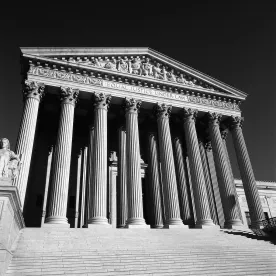On Wednesday, the Supreme Court issued its much-anticipated decision in Digital Realty Trust, Inc. v. Somers.1 Ruling 9-0, the Court held that the Dodd-Frank Act prohibits retaliation against whistleblowers only if they reported suspected wrongdoing directly to the SEC. The Court invalidated an SEC rule, promulgated in 2011, which purported to apply Dodd-Frank’s antiretaliation protections to employees who report potential violations to their employer as well as to those who communicate their concerns to the SEC.2
Resolving a Circuit split,3 Justice Ginsburg, writing for the Court,4 emphasized that the “core objective” of the Dodd-Frank whistleblower program is “to motivate people who know of securities law violations to tell the SEC.”5 The Court saw this objective reflected in the statute’s definition of “whistleblower,” which is limited to “any individual who provides . . . information relating to a violation of the securities laws to the Commission.”6 The Court held that definition to be dispositive, and was not persuaded by arguments made by the employee (Somers) and the SEC that a broader definition was required by a different section of the statute, which provides that a “whistleblower” is protected from retaliation when “making disclosures that are required or protected under the Sarbanes-Oxley Act of 2002.”7 The Sarbanes-Oxley whistleblower regime, unlike Dodd-Frank’s, expressly protects internal as well as external whistleblowers.8
Securities Litigation
The primary significance of Digital Realty is its impact on the process available to employees with whistleblower-retaliation claims. Because employees who report internally, but not to the SEC, are now excluded from Dodd-Frank protection, their recourse is limited to state-law claims or private actions under Sarbanes-Oxley. Under Sarbanes-Oxley, a whistleblower must file a retaliation claim first with the Occupational Safety and Health Administration (OSHA) within 180 days of becoming aware of the retaliation, and can file in federal court only if OSHA does not rule within 180 days.9 Under Dodd-Frank, by contrast, a whistleblower can go straight to federal court to allege retaliation, and has a much longer statute of limitations—at least six years and in some cases as long as 10 years.10 In addition, under Sarbanes-Oxley, prevailing whistleblowers are entitled to reinstatement, back pay, and special damages (including litigation fees and costs),11 while under Dodd-Frank they can win reinstatement and double back pay, but no special damages other than litigation fees and costs.11
Whether the Court’s ruling will have a larger systemic impact is open to debate. As the Chamber of Commerce argued in its amicus brief,12 restricting Dodd-Frank protection to SEC reporting only could limit the number of costly whistleblower claims brought in federal court, and could cut off some claims entirely if internal-only whistleblowers miss the 180-day statute of limitations in Sarbanes-Oxley. On the other hand, the SEC and the whistleblower bar have argued that narrowing the rights of internal-only whistleblowers would incentivize more employees to report suspected violations externally,13 which could deprive companies of the opportunity to address issues internally and increase the likelihood of an SEC investigation. At the same time, whether the SEC can continue to bring anti-retaliation enforcement actions in cases where the employee reported internally only is uncertain. The SEC has indicated that it may not have such authority under Sarbanes-Oxley.14
Whichever of these predictions proves accurate, the critical message for companies is that it remains illegal to retaliate against whistleblowers, and that whistleblowers can still sue for retaliation, whether through Dodd-Frank, Sarbanes-Oxley, or state employment law. Companies therefore need to continue to ensure that their culture and process encourage whistleblowers to address issues internally, rather than run the risk of instigating a costly, burdensome, and potentially damaging government investigation.15
1. 2018 WL 987345, 538 U.S. __ (2018).
2. 17 C.F.R. § 240.21F–2.
3. See Asadi v. GE Energy (USA), LLC, 720 F.3d 620 (5th Cir. 2013) (finding SEC reporting required); Berman v. Neo@Ogilvy LLC, 801 F.3d 145 (2d Cir. 2015) (finding SEC reporting not required); Somers v. Digital Realty Trust, Inc., 850 F.3d 1045 (9th Cir. 2017) (finding SEC reporting not required).
4. Justice Ginsburg wrote for the full Court, with Justice Thomas, joined by Justice Alito and Justice Gorsuch, filing an opinion concurring in part and concurring in the judgment; and Justice Sotomayor, joined by Justice Breyer, filed a concurring opinion.
5. 2018 WL 987345, at *9 (emphasis in original).
6. 15 U.S.C. § 78u-6(a)(6).
7. 15 U.S.C. § 78u-6(h)(1)(A)(iii).
8. Compare 18 U.S.C. § 1514A(a)(1) with 15 U.S.C. § 78u-6(h)(1)(A)(iii).
9. 18 U.S.C. § 1514A(b)(1) and (b)(2)(D).
10. 15 U.S.C. § 78u-6(h)(1)(B). 11 18 U.S.C. § 1514A(c).
11. 15 U.S.C. § 78u-6(h)(1)(C).
12. See Brief of the Chamber of Commerce of the United States of America as Amicus Curiae in Support of Petitioner on Petition for a Writ of Certiorari to the U.S. Court of Appeals for the Ninth Circuit, Digital Realty Trust, Inc. v. Somers, 2018 WL 987345 (U.S.) (No. 16-1276), 2017 WL 2351019, at *9-12.
13. See Brief of the Securities and Exchange Commission, Amicus Curiae in Support of the Appellee, Somers v. Digital Realty Trust, 850 F.3d 1045 (9th Cir. 2017) (No. 15-17352), 2016 WL 3088310, at *913.
14. See id. at *31 n.25.
15. See David L. Kornblau & Stephen Dee, Whistleblower Retaliation: How Companies Should Prepare for the Supreme Court’s Upcoming Decision, N.Y.L.J. (Dec. 15, 2017).
Attorneys Gerald Hodgkins, Nancy Kestenbaum, David Kornblau, Daniel Shallman, Doug Sprague, Barbara Hoffman and Stephen Dee also contributed to this article.







 />i
/>i

